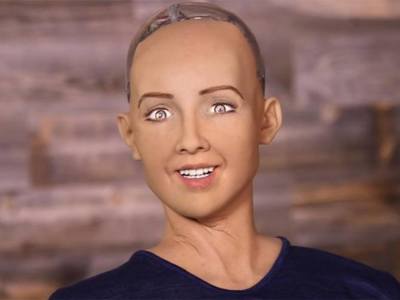Humanoid robots and how we're failing at human relationships

In 2010, a company called Hanson Robotics spent more than a hundred hours interviewing a woman named Bina. They collected memories of her childhood, noted her emotional reactions and mannerisms, uploaded the data into a mechanical bust that looked like the real Bina, and then programmed the robot to answer questions in real time. Robot Bina now resides in a research lab. Real-life Bina’s partner said the venture was a shot at “immortality.”
Recently, Hanson Robotics announced plans to release thousands of what they’re calling “Sophia” robots. Sophia is a “social robot” that can perform rudimentary medical tasks, like taking a person’s temperature, but can also make facial expressions and utter a few phrases. According to company CEO David Hanson, “Sophia” is programmed to offer “human warmth” and is being released this year especially in order to help elderly people who are living in isolation due to the pandemic.
Back in 1984, in her provocative book The Second Self, MIT professor Sherry Turkle made a prophesy of sorts. It was an expectation that seems obvious today but was pretty bold at the time. She predicted that computers would become more than just tools of mathematical calculation and increasingly become places where we live our lives. A decade or so later, in a book entitled Life on the Screen, Turkle predicted that we’d soon move beyond merely living some of our lives on the internet to creating entirely new, different, and multiple lives on the internet. So far, Turkle is two for two.
Turkle’s third book, titled Alone Together, wasn’t written until 2011. In it, she made another prediction. She believed that a culture so accustomed to digital life and so bad at human relationships would not be able to resist replacing those relationships with artificial intelligence. Again, Turkle got it right. The difference between this book and her previous two was that Turkle’s optimism about where technology was taking us was gone.
Sophia the Robot is Turkle’s prediction plugged in and turned on, with an important clarification: Hanson Robotics didn’t make Sophia just because they could. They’re capitalizing on something in our culture that needs to be recognized. We’re failing each other.
In Alone Together, Turkle predicted that a culture obsessed with convenience would grow increasingly averse to the inconvenience of love. The rise in family estrangement during 2020 is just one piece of supporting evidence. Why bear with people when a robot that looks like a person can give us everything we think we want without all the neediness? A booming market for human-like artificial intelligence isn’t just a sign that we’re expecting too much from robots. As Turkle says in her subtitle, we’re also expecting too little from each other. Maybe that’s because we’re giving too little to each other.
Also priming the global marketplace for companion robots are almost universally low birth rates. Japan’s plummeting birth rate means an increasing number of citizens have no extended family or even siblings. Chuck Colson talked about this all the way back in 2005, when a Japanese company began selling lifelike baby dolls to the lonely elderly. A childless society, Colson said, learns too late that it’s created a void no “toy” can fill. Neither can Sophia the robot.
There’s also a deeper moral problem with these “humanoid” robots. The sexual revolution separated body from soul, pretending to elevate the body but actually degrading bodies into mere objects to be used for pleasure. Christians also sometimes make a similar mistake when they treat the body as an “obstacle” to a truly “spiritual” life.
An honest reading of the Bible, however, reveals Christianity to be what author Christopher West calls an “en-fleshed” faith. As he says in his book Our Bodies Tell God’s Story, God created His image-bearers with bodies and souls. To try to separate the two is to reject His design.
To replace a real human-to-human relationship with an artificially intelligent robot is also to separate body and soul. Except, instead of looking for bodies without souls, we’re looking for souls without bodies.
No collection of charming phrases, human-like movements, injected life memories, or empathetic facial expressions will be an image-bearer. Interactions with Sophia robots may be interesting or even impressive. Sophia 2.0 and 3.0 may be even more “life-like” in different ways. We might find a human facsimile that never ages, is never demanding, and always there when we need it quite convenient. However, more convenient isn’t the same as better.
The greatest commandments, to “love God” and “love our neighbors as ourselves,” are almost so familiar they’re boring. But, in the land of the blind, the one-eyed man is king. In the land of humanoid robots, someone who knows how to actually love another can change everything.
Originally posted at breakpoint.org
From BreakPoint. Reprinted with the permission of the Colson Center for Christian Worldview. All rights reserved. May not be reproduced or distributed without the express written permission the Colson Center for Christian Worldview. "BreakPoint®" and "The Colson Center for Christian Worldview®" are registered trademarks of The Colson Center for Christian Worldview.
John Stonestreet is the President of the Chuck Colson Center for Christian Worldview, and co-host with Eric Metaxas of Breakpoint, the Christian worldview radio program founded by the late Chuck Colson. He is co-author of A Practical Guide to Culture, A Student's Guide to Culture and Restoring All Things.





















